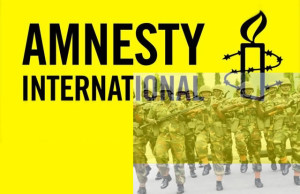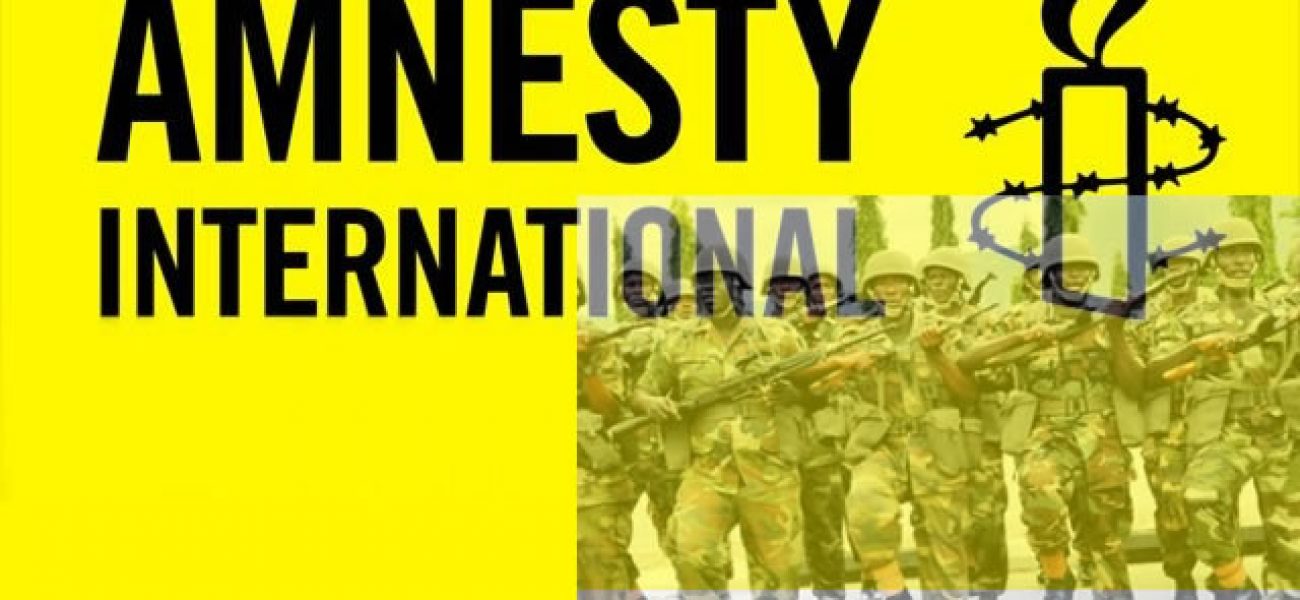 There have been concerns in some quarters over the allegations contained in Amnesty International’s report titled “ Star on Their Shoulders, Blood on Their Hands[1]” which accuses the Nigerian military of perpetrating horrific war crimes in the pretext of fighting insurgency in the North East.
There have been concerns in some quarters over the allegations contained in Amnesty International’s report titled “ Star on Their Shoulders, Blood on Their Hands[1]” which accuses the Nigerian military of perpetrating horrific war crimes in the pretext of fighting insurgency in the North East.
The report claims that since March 2011 more than 7, 000 young men and boys have died in Nigeria’s military detention and that more than 1,200 people were unlawfully killed since February 2012. While these mass deaths are linked to starvation, dehydration, disease, overcrowding, suffocation, fumigation, torture and extrajudicial executions during the period of detention, there are allegations that deaths happened within the knowledge of Nigeria’s senior military officers “who consistently failed to take meaningful action.”
Already, the Nigerian military has denied the authenticity of the report, which Amnesty International claims to have obtained from years of research and analysis of evidence such as leaked military reports and correspondence, interviews with more than 400 victims, eyewitnesses and senior members of the Nigerian security forces. The Director of Nigeria’s Defence Information, Major. General Chris Olukolade for instance has expressed dismay over the report accusing Amnesty International of being biased. The report has also been dismissed as a rehash of a previous allegation made in 2011[2]. Social media and some civil society groups have also perceived Amnesty’s report as being unbalanced in the light of the gross human rights violations and crimes against humanity committed by Boko Haram. In response to the allegations, President Buhari has assured Nigerians as well as the international human rights group that his government will closely study the report and carry out an internal investigation to verify the authenticity of the claims and take necessary steps towards addressing the issue. The incoming Attorney General is also expected to look into the report and advise the government appropriately.
This is not the first time that Nigeria has been accused of extensive human rights abuses. It will be recalled that the United States refused to sell arms to Nigeria to fight its war against insurgency as it claimed that its internal laws prevent transactions of such kind with countries with a legacy of human rights abuse. The report has also brought the detention laws and prison system in Nigeria under the spotlight as many persons continue to be detained without trial. For example, according to the Nigerian Prisons Service Statistics in June 2014, out of 56,785 inmates in the country, 38,743, (that is 68 percent) are awaiting trial[3].
Coincidentally, the National Assembly recently passed the Criminal Justice (Release from Custody) (Special Provision) (Amendment) Bill 2015 which provisions among others, empower the Chief Justice and State Chief Judges to release detained prisoners where their imprisonment is manifestly unlawful or where they have been in custody longer than the maximum period of imprisonment he would have received if he had been convicted. However, the Bill is yet to receive Presidential assent as it will be recalled that it was one of the 15 Bills passed by the House in one sitting on 4th June 2015 following the adoption of a special procedure on Bills transmitted from the Senate in pursuance of Order 1, Rule 1(2) of its Standing Orders.
Amnesty International has recommended that the Nigerian government arraign the military officers accused of partaking in the war crimes to the International Criminal Court (ICC) in the Hague, Netherlands. This is because the ICC’s jurisdiction is limited to the most serious crimes of concern to the international community as a whole. Under article 8, war crimes include wilful killing, torture, inhuman treatment, and wilfully causing great suffering or serious injury to body or health[4].
[1] https://www.amnesty.org/latest/news/2015/06/stars-on-their-shoulders-blood-on-their-hands/
[2] http://saharareporters.com/2015/06/19/350-boko-haram-suspects-face-trial-respond-amnesty-international-nigerian-army, 19 June, 2015
[3] http://www.punchng.com/feature/in-nigerian-prisons-cctv-cameras-are-mere-decorations-investigation/ by Gbenro Adeoye, 10 January, 2015
[4] Rome Statute of the International Criminal Court
http://www.icc-cpi.int/NR/rdonlyres/ADD16852-AEE9-4757-ABE7-9CDC7CF02886/283503/RomeStatutEng1.pdf

